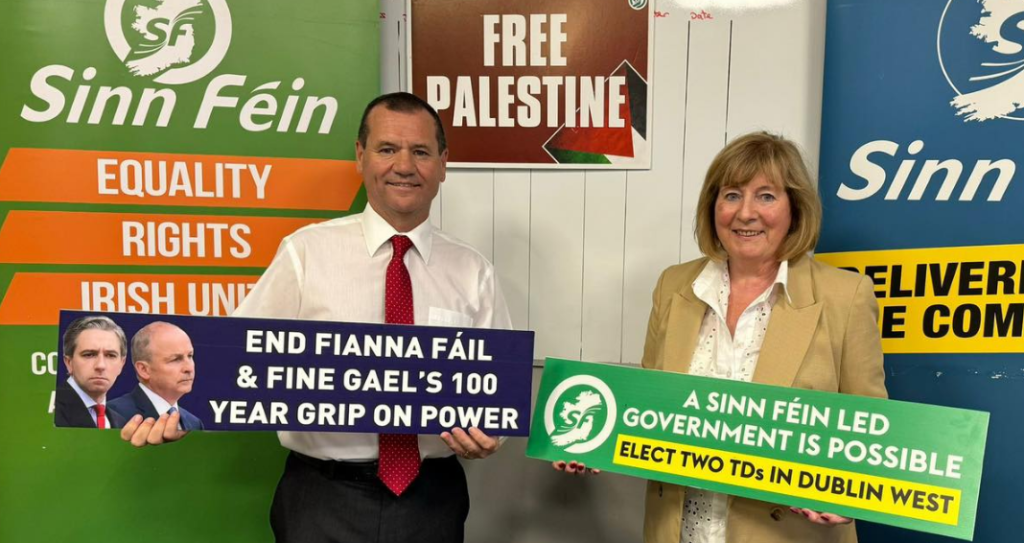Sinn Féin has announced they will be running two candidates in Dublin West at the upcoming general election.
Ever since it was confirmed last August that Dublin West was being upgraded to a five-seater, it seemed inevitable that Sinn Féin would try and take advantage of Donnelly’s dominant 2020 electoral performance and they have done so.
Donnelly himself will headline the ticket for Sinn Féin, and freshly re-elected councillor Breda Hanaphy will look to secure an extra seat for Sinn Séin in what is a must-win constituency.
Donnelly’s dominant 2020 electoral performance, getting elected on the first count at the expense of then-Taoiseach Leo Varadkar, was one of the stories of that election cycle.
Now Sinn Féin are looking to make lightning strike twice.
Both candidates were selected at a selection convention in mid-August.
Donnelly said he was “honoured” to have been selected once again to represent Sinn Féin in Dublin West.
“Our community needs strong, effective leadership, and I am committed to continuing the fight for the changes our people deserve. We are calling on voters to end Fianna Fáil and Fine Gael’s 100 year grip on power in this State. There now exists an opportunity to elect a Sinn Féin government by returning two republican TDs in Dublin West.”
Hanaphy said “I am excited to join Paul in this campaign. Together, we will work tirelessly to ensure that the voices of Dublin West are heard, and that real, transformative change is delivered.”
Hanaphy has faced the electorate more recently than Donnelly, winning re-election in Blanchardstown-Mulhuddart.
In a statement, Sinn Fein said their main priorities would be providing affordable housing, pushing for a single-tier health service, tackling the cost of living crisis, and investing in local communities.
In 2020, Donnelly saw his share of the vote double compared to the 2016 general election, helping him get elected on the first count with 28.6% of first preferences.
Fine Gael ran two candidates in the 2020 general election – then-Taoiseach Leo Varadkar and future Senator Emer Currie – but only Varadkar was successful on that occasion.
Currie is expected to be one of Fine Gael’s candidates that will contest the selection convention for Dublin West, with the convention due to be held in September.
Fine Gael are expected bring run two candidates in the constituency after seeing success in the area in June and the expanded five-seater nature of the seat.
Donnelly and Hanaphy join Castleknock councillors, John Walsh of Labour and Ellen Troy of Aontú, and government ministers Jack Chambers of Fianna Fáil and Roderic O’Gorman of the Greens in declaring their general election candidacy.
Recently re-elected Solidarity councillor Ruth Coppinger is widely expected to run in the general election, looking to win back the Dáil seat she held between 2014 and 2020.
Dublin West falls into the jurisdiction of both Dublin City Council and Fingal County Council.
The constituency is one of the most sprawling in the country, taking in Phoenix Park, Ashtown, Castleknock, Blanchardstown, Ongar and Clonsilla.
Parts of Cabra-Glasnevin, Castleknock, Blanchardstown-Mulhuddart and Ongar are the four constituencies that make up Dublin West at a local level.
Despite Sinn Féin running 11 candidates across the four constituencies, just three (Angela Donnelly, Hanapy and Seamus McGrattan) were elected.
In the case of Hanapy, her share of the vote dropped compared to 2019 as Sinn Féin opted to run three candidates in her constituency, but only Hanapy was successful in winning election.
Across Dublin West, Sinn Féin suffered from poor turnout as well as their voter coalition that served them so well in 2020 being scattered to the wind.
Victories for Solidarity in Castleknock and Blanchardstown-Mulhuddart was a clear indication that the traditional socialist vote in Dublin West, which had previously rewarded TDs such as Joe Higgins and Ruth Coppinger, did not bolt for Sinn Féin despite the aftermath of the 2020 general election showing that particular voter bloc was up for grabs.
In Cabra-Glasnevin, left-wing independent councillor Cieran Perry attained 10.4% and proved transfer-friendly in a way that Sinn Féin didn’t.
Sinn Fein’s total share of the vote in Cabra-Glasnevin came to 16.7%, but came up against a resilient centre-left/progressive vote.
For the purposes of clarification, this includes the Greens, the Social Democrats and Labour.
In Cabra-Glasnevin, the Green/Social Democrats/Labour share of first preferences came to exactly 28%, split between four separate candidates, averaging a total of exactly 7% each and proving more transfer-friendly.
Sinn Féin’s four candidates by contrast amassed an average of 4.2% in first preferences between them.
The explicitly left-wing vote (which again, for the purposes of clarification, includes Perry, the Workers’ Party and People Before Profit) came to 14.9% in the constituency, or 4.9% on average.
Wins for Aontú in Castleknock and Ongar also indicate that the more socially conservative-minded voter that aren’t receptive to Fianna Fáil and Fine Gael’s economic policies no longer plan to vote for Sinn Féin.
With the Green vote freefalling in Castleknock (a 27.2% victory in 2019 translated to a 7.1% loss in 2024) Sinn Féin failed to capitalise on this collapse, with Labour and Fine Gael benefiting.
In Blanchardstown-Mulhuddart, where the party ran three candidates, the vote dropped 0.5% compared to 2019 with a higher turnout.
In 2019, Sinn Féin’s two candidates amassed 20.5% between them, and received exactly 20% in June when they ran three candidates in 2024.
Fine Gael were the big winners in Dublin West in June; compared to Sinn Fein’s 11 candidates translating to three councillors, Fine Gael ran six candidates and ended up with five councillors.
With a general election widely speculated to take place this side of Christmas, time is running out for Sinn Féin to rebuild their broad coalition of voters that allowed them to win the popular vote in 2020.
